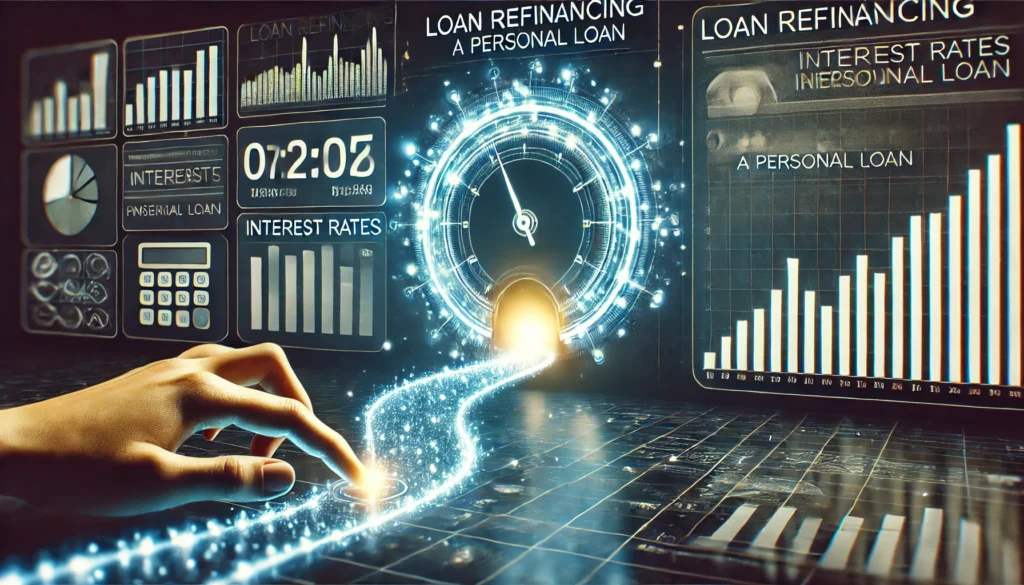Understanding Personal Loan Refinancing and Its Impact on Student Debt
Refinancing a personal loan can be a strategic financial move, particularly for those grappling with student debt. Many graduates find themselves juggling multiple loans, each with different interest rates and repayment terms. The question, “How soon can you refinance a personal loan?” is an important one, as it directly impacts financial planning and debt management. The answer depends on several factors, including lender policies, creditworthiness, and prevailing market conditions. Understanding these nuances can help borrowers make informed decisions and potentially reduce their overall financial burden.
You may also like: Best Student Loan Refinance Options in 2025: Compare Rates & Save Thousands
For recent graduates burdened with student loans, refinancing personal loans can offer a pathway to lower monthly payments and reduced interest rates. However, jumping into refinancing too soon may not always be beneficial. Lenders typically require borrowers to demonstrate a track record of timely payments and stable income before approving a refinancing request. Additionally, the market environment, including Federal Reserve rate changes, can influence whether refinancing at a particular time is advantageous. By carefully analyzing their financial situation, borrowers can determine the optimal timing for refinancing a personal loan.

The Basics of Personal Loan Refinancing
Personal loan refinancing involves replacing an existing loan with a new one, ideally with better terms. This financial strategy can lead to lower interest rates, reduced monthly payments, or a more manageable repayment term. For individuals balancing student loans alongside other debts, refinancing a personal loan can provide much-needed financial relief. The process typically requires an assessment of credit history, income stability, and current loan terms to determine eligibility and potential benefits.
One of the primary motivations for refinancing personal loans is securing a lower interest rate. This is particularly crucial for borrowers who initially took out loans with high-interest rates due to limited credit history or suboptimal financial conditions. As their credit scores improve and financial standing stabilizes, they may qualify for more favorable rates through refinancing. Additionally, some borrowers refinance to extend their loan term, which can reduce monthly payments, though it may result in higher total interest payments over the life of the loan.
Another critical consideration is whether refinancing a personal loan aligns with broader financial goals. If the objective is to accelerate student loan repayment, then securing a lower monthly payment on a refinanced personal loan can free up funds for additional student loan payments. However, if refinancing results in a longer loan term with higher total interest costs, borrowers must weigh the long-term implications against their immediate financial relief.
How Soon Can You Refinance a Personal Loan?
The timing of personal loan refinancing depends on multiple factors, including lender policies and personal financial circumstances. Some lenders allow refinancing immediately after loan origination, while others require borrowers to establish a payment history of at least six months. Understanding these lender-specific requirements can help borrowers plan their refinancing strategy effectively.
One of the most influential factors in determining how soon a borrower can refinance a personal loan is their credit score. If a borrower’s credit has significantly improved since taking out the original loan, they may qualify for better rates and terms sooner. For instance, someone who initially secured a personal loan with a fair credit score but has since built a strong credit profile through responsible debt management might be eligible for refinancing within a few months.
Lenders also assess income stability and debt-to-income ratio when considering refinancing applications. Borrowers who have recently secured higher-paying jobs or additional income sources may find themselves in a stronger position to refinance their personal loans earlier. Demonstrating a consistent ability to meet financial obligations can increase approval chances and result in more favorable loan terms.
Market conditions also play a significant role in determining whether refinancing a personal loan is beneficial. Interest rates fluctuate based on economic trends, Federal Reserve policies, and broader financial markets. Borrowers should monitor these trends to identify optimal refinancing opportunities. For instance, if interest rates drop significantly, refinancing earlier may be a prudent decision, even if a borrower has only recently taken out their original loan.
The Benefits and Drawbacks of Refinancing Personal Loans for Student Debt Relief
Refinancing a personal loan offers several potential advantages, particularly for those managing student debt. One of the most immediate benefits is the possibility of securing a lower interest rate, which can result in substantial savings over the loan term. Reduced monthly payments can also provide greater financial flexibility, allowing borrowers to allocate more funds toward student loan repayment or other essential expenses.
Another advantage is the ability to consolidate multiple debts into a single loan with a more manageable repayment structure. For graduates juggling multiple personal loans and student loans, refinancing can simplify financial management and reduce the risk of missed payments. Additionally, some lenders offer flexible repayment options, such as deferment or forbearance, which can be beneficial in times of financial hardship.
However, refinancing also has potential drawbacks that borrowers must consider. Extending the loan term to reduce monthly payments can lead to higher overall interest costs. Additionally, some lenders charge origination fees or prepayment penalties, which can offset the financial benefits of refinancing. Before committing to refinancing, borrowers should carefully review all terms and conditions to ensure the long-term benefits outweigh the costs.
Strategies for Maximizing the Benefits of Refinancing Personal Loans
To make the most of personal loan refinancing, borrowers should adopt strategic financial planning. First, improving credit scores before applying for refinancing can result in significantly better loan terms. This can be achieved by making timely payments on existing debts, reducing credit utilization, and avoiding new credit inquiries that could temporarily lower scores.
Second, comparing multiple lenders is essential to securing the most favorable refinancing terms. Different lenders have varying criteria for loan approval, interest rates, and fees. Utilizing online comparison tools and prequalification options can help borrowers identify the best refinancing offers without negatively impacting their credit scores.
Finally, aligning refinancing decisions with broader financial goals ensures long-term benefits. If the primary objective is to accelerate student loan repayment, borrowers should prioritize refinancing options that free up cash flow without significantly increasing total interest costs. Additionally, refinancing should be timed strategically to coincide with favorable market conditions, maximizing potential savings.

Frequently Asked Questions (FAQ) on Refinancing a Personal Loan
1. Can you refinance a personal loan to get a lower interest rate? Yes, refinancing personal loan debt can help you secure a lower interest rate, reducing the total cost of your loan. If your credit score has improved since you first took out the loan, you may qualify for better terms. Additionally, refinancing can help you switch from a variable to a fixed rate, providing more stability in your monthly payments. However, it is crucial to compare refinancing options to ensure that the new loan offers substantial savings after factoring in any fees. Before deciding to refinance a personal loan, carefully analyze your financial situation and future repayment ability.
2. How soon can you refinance a personal loan after taking it out? The timing for refinancing personal loan debt depends on the lender’s policies, but many allow refinancing as soon as a few months after taking out the loan. However, refinancing too soon may not be beneficial if prepayment penalties or origination fees offset the potential savings. Ideally, you should wait until your credit score has improved or market interest rates have dropped. If you are considering how soon can you refinance a personal loan, be sure to check the terms of your current loan for any restrictions. Refinancing at the right time can help you secure better repayment terms and lower costs.
3. What are the risks of refinancing a personal loan? While refinancing personal loan debt can provide financial benefits, there are also potential risks. Extending your loan term may reduce your monthly payments but increase the overall interest paid over time. Additionally, some lenders charge fees for refinancing, which could offset the savings. If you refinance personal loan obligations multiple times, you might also see a temporary dip in your credit score due to hard inquiries. To avoid potential pitfalls, carefully assess the long-term impact of refinancing before making a decision.
4. Can you refinance a personal loan with the same lender? Yes, some lenders allow borrowers to refinance a personal loan with them, often offering incentives such as reduced fees or quicker processing. However, it is wise to compare offers from other lenders to ensure you are getting the best deal. In some cases, switching lenders may provide lower interest rates or better repayment terms. If you decide to refinance a personal loan with the same lender, make sure to negotiate terms that align with your financial goals. Always read the fine print to ensure you understand the new loan agreement.
5. How does refinancing a personal loan impact your credit score? Refinancing personal loan debt can have both positive and negative effects on your credit score. The application process usually involves a hard credit inquiry, which may cause a temporary dip in your score. However, if you secure a lower interest rate and make consistent payments, your credit score may improve over time. Additionally, closing an old loan account could affect your credit history length, which is a factor in credit scoring. Weighing these factors carefully before refinancing can help you make a financially sound decision.
6. What documents are needed to refinance a personal loan? When you refinance personal loan debt, lenders typically require documentation such as proof of income, credit reports, and details of your existing loan. You may also need to provide employment verification and bank statements. Ensuring all necessary documents are prepared in advance can speed up the refinancing process. Some lenders may also request additional information, such as your debt-to-income ratio, to determine your eligibility. Being organized with your paperwork can help you secure the best refinancing terms.
7. Are there any fees associated with refinancing a personal loan? Yes, refinancing personal loan obligations may come with fees such as origination charges, prepayment penalties, or administrative costs. Some lenders waive these fees for well-qualified borrowers, so it is important to shop around for the best deal. Before proceeding, calculate whether the savings from refinancing outweigh any upfront costs. Comparing different lenders can help you find a refinancing option that minimizes fees while maximizing savings. Always read the loan terms carefully to avoid unexpected charges.
8. Can you refinance a personal loan to consolidate debt? Yes, many borrowers refinance personal loan balances to consolidate multiple debts into a single monthly payment. This can simplify financial management and potentially secure a lower interest rate. However, consolidation through refinancing works best if the new loan terms offer better repayment conditions. If you are exploring refinancing personal loan debt for consolidation, compare interest rates and repayment periods to ensure it is a cost-effective decision. Properly managing the new loan can help you avoid accumulating additional debt.
9. How can you improve your chances of getting approved for refinancing? To improve your chances of getting approved to refinance personal loan debt, work on boosting your credit score and reducing your overall debt-to-income ratio. Paying down existing debt and making timely payments on current loans can demonstrate financial responsibility to lenders. Additionally, shopping around for lenders that cater to borrowers with your credit profile can increase approval odds. If needed, consider applying with a co-signer who has a strong credit history. Taking these steps can help you secure the best refinancing terms available.
10. Should you refinance a personal loan if interest rates drop? Refinancing a personal loan when interest rates drop can be a smart financial move, but it is essential to consider all factors before proceeding. Lower interest rates can reduce your monthly payments and total interest costs, but refinancing fees must be weighed against potential savings. Additionally, if you have improved your credit score since taking out the original loan, you may qualify for even better terms. Before making a decision, use a loan calculator to estimate the impact of refinancing personal loan debt. A careful evaluation can help you determine whether refinancing aligns with your financial goals.

Conclusion:
Refinancing a personal loan can be a valuable tool for managing student debt, but the timing and terms of refinancing must be carefully considered. The question of “how soon can you refinance a personal loan?” depends on factors such as creditworthiness, lender policies, and market conditions. By understanding these elements and strategically planning refinancing efforts, borrowers can optimize their financial health and work towards long-term debt relief.
Tags
student loan refinancing, debt management tips, financial planning for graduates, personal loan refinancing strategies, best time to refinance a loan, reducing student debt, credit score improvement, refinancing eligibility, personal loan interest rates, financial freedom strategies, loan repayment planning, best lenders for refinancing, student debt solutions, loan consolidation tips, financial literacy for graduates, money-saving strategies, lower interest rate loans, refinancing benefits and risks, optimizing loan payments, responsible borrowing strategies
Further Reading:
How Soon Can You Refinance a Personal Loan?
When And How To Refinance A Personal Loan
Refinancing a personal loan: What it is and how it works
Legal Disclaimer
The information provided in this article is for general informational purposes only and is not intended to constitute financial, investment, legal, tax, or other professional advice. The content should not be relied upon for making any financial or investment decisions. Readers are encouraged to consult with licensed professionals, such as financial advisors, attorneys, or tax experts, to obtain personalized advice tailored to their individual circumstances. The author and publisher disclaim any liability for any actions taken or not taken based on the information provided in this article.





